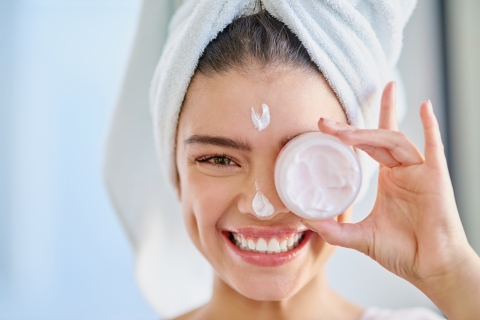
“Healthy skin is a reflection of overall wellness.” –Dr. Howard Murad
With thousands of skin products on the market, it can be difficult to figure out what’s the best way to take care of your skin. Skin care is beyond topical treatments, it’s a combination of what you put into your body and what you put on your body.
Different internal and external lifestyle factors can affect the appearance of your skin. For example, cold weather could trigger eczema, while warmer weather could trigger acne. Too much sun exposure could lead to pigmentation and accelerate aging skin.
There’s a world of tips, but here are some of the most effective ways you can care for your body’s largest organ.
- Exfoliate. Your skin regenerates itself creating a new layer at an average of once a month. Exfoliating removes the dead cells from the outer layer of your skin. Use an exfoliating scrub or skin tool such as a towel or face brush and massaging your skin with an exfoliating cleanser and warm water in circular motions for 1-2 minutes. Finish by rinsing the skin and patting dry with a clean towel. Do this two-three times a week for normal skin, and once a week for sensitive skin. Tip: Pat your skin dry with a towel rather than wiping it dry to prevent tugging at the skin and losing elasticity.
- Moisturize. Depending on the type of skin you have, it’s important to get a moisturizer that meets the needs of your skin. When choosing a moisturizer, consider your skin type and make sure it matches with the label of the product. Check here to see what type of skin you may have, or check with your doctor.
- Normal
- Dry Skin
- Oily skin
- Sensitive Skin
- Mature Skin
- Apply sunscreen. Wearing sunscreen is not only for beach days. Sunscreen is a preventive and protective measure against damage from ultraviolet rays. Wearing it year-round could help reduce the risk of skin cancer and prevent premature aging. Sometimes you can find a moisturizer with SPF.
- Take off your makeup. Just as you brush your teeth, you also should remove your makeup and wash your face. Refusing to remove makeup before you go to sleep can cause extensive damage to your skin. It will clog your pores, and can cause breakouts of acne and blackheads. Wipe away excess makeup with a makeup wipe, and follow with a deep cleanser to remove all dirt.
- Drink water. Simple as can be, drinking water can improve your complexion. Dehydrated skin will result in dry, tight, flaky skin. Drinking large amounts of water can prevent wrinkles and tighten pores.
- Drink green tea. This can help reduce inflammation, improve elasticity and protect you from sun damage. Green tea also promotes DNA repair to help fight skin cancer.
- Eat well.
- Fruits and vegetables are key to internally infusing vitamins into your skin. Foods such as cantaloupes, carrots and sweet potatoes are packed with vitamin A, which keeps your complexion clear. Other skin superfoods include berries, tomatoes, apricots, beets, squash, spinach, tangerines and peppers.
- Fatty fish such as salmon, mackerel and herring supply omega-3 fatty acids, which reduce inflammation and helps keep skin supple. Studies have found that fish oil could also help fight lupus and psoriasis.
- Walnuts are another good source of fatty acids. It supplies balanced nutrients that help the skin function properly and aid in healing wounds and fighting bacteria.
- Cut back on dairy. There could be hormones found in milk that can trigger acne. If you have acne and drink milk often, try going dairy-free for at least one month and see if you notice any changes in your complexion. If you are worried about not getting enough calcium or vitamin D, you can also find the same nutrients in fortified orange juice, or even a multivitamin with vitamin D and calcium.
- Don’t touch your face. Picking at your face may be tempting when there’s acne present, but keep your hands off. Do you rest your chin or cheeks on your hands? Notice a breakout? Bacteria can easily transfer from your fingertips to your face with just one touch.
- Sanitize your phone. When was the last time you wiped and sanitized the screen of your cell phone? Pressing your phone up against your face after touching it with unwashed hands could spread bacteria and clog pores on your face, as well as cause painful pimples or acne cysts. Find cleaning wipes with hydrogen peroxide and wipe down all surfaces of the phone to kill the bacteria off of your phone.
Implementing a few of these steps may improve the health of your skin. Make a habit out of it now preventive measures are always easier than corrective measures. Remember, healthy skin starts within.
